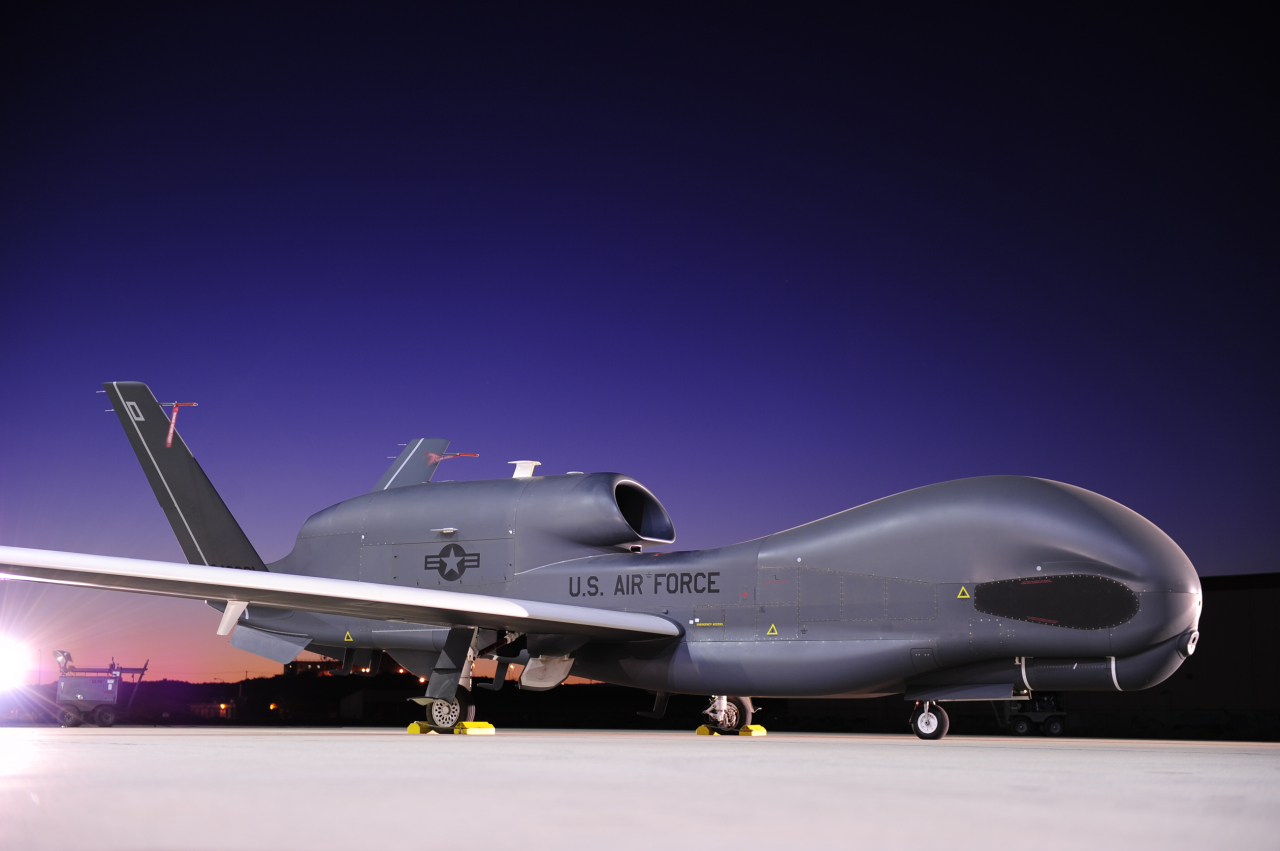
South Korea has brought in a US-made advanced spy drone that will improve its surveillance of North Korean military activities, the military said Monday.
The RQ-4 Block 30 Global Hawk arrived at the Air Force base in the city of Sacheon, South Gyeongsang Province, earlier on the day. It is the first of four units that South Korea is buying from the US as part of a 2011 deal, with the other three coming in a year later.
The Air Force said the military will deploy the aircraft in accordance with its plans, without elaborating. The all-weather spy drone, which transmits data from altitudes of roughly 20 kilometers at near real-time speed and has a combat radius of 3,000 kilometers, covers areas beyond the Korean Peninsula.
South Korea will be able to gather intelligence on mainland North Korea, especially areas close to the capital, Pyongyang, without Washington, whose intelligence gathering activities have provided that information. But the South will still need help from the US for an extensive surveillance of the isolated North.
Tension is rising on the Korean Peninsula in the run-up to Christmas, when North Korean leader Kim Jong-un is expected to deliver what he calls a “Christmas gift” to US President Donald Trump amid their stalled nuclear talks, which fell apart last time in Hanoi in February. The gift is understood to mean another provocation.
Since the collapse of the Hanoi summit, Kim has demanded Trump offer him a “new calculation” by the end of this year and revitalize the nuclear negotiations. Pyongyang, which is seen as seeking concessions from Washington, warned it will pursue a “new path,” instead of dialogue, if the US misses the deadline.
The North earlier carried out rocket engine tests twice at its Sohae Satellite Launching Station, known as the Tongchang-ri site, in what many fear to be part of preparations to fire an intercontinental ballistic missile, which the isolated country last test-fired in 2017.
The previous week, US special envoy for North Korea Stephen Biegun made stops in Seoul, Tokyo and Beijing to discuss Pyongyang’s denuclearization. Biegun’s overtures for talks went unanswered by Kim Jong-un. Whether top US nuclear negotiator tried any behind-the-scenes contact with the regime was unclear.
By Choi Si-young (siyoungchoi@heraldcorp.com)
The RQ-4 Block 30 Global Hawk arrived at the Air Force base in the city of Sacheon, South Gyeongsang Province, earlier on the day. It is the first of four units that South Korea is buying from the US as part of a 2011 deal, with the other three coming in a year later.
The Air Force said the military will deploy the aircraft in accordance with its plans, without elaborating. The all-weather spy drone, which transmits data from altitudes of roughly 20 kilometers at near real-time speed and has a combat radius of 3,000 kilometers, covers areas beyond the Korean Peninsula.
South Korea will be able to gather intelligence on mainland North Korea, especially areas close to the capital, Pyongyang, without Washington, whose intelligence gathering activities have provided that information. But the South will still need help from the US for an extensive surveillance of the isolated North.
Tension is rising on the Korean Peninsula in the run-up to Christmas, when North Korean leader Kim Jong-un is expected to deliver what he calls a “Christmas gift” to US President Donald Trump amid their stalled nuclear talks, which fell apart last time in Hanoi in February. The gift is understood to mean another provocation.
Since the collapse of the Hanoi summit, Kim has demanded Trump offer him a “new calculation” by the end of this year and revitalize the nuclear negotiations. Pyongyang, which is seen as seeking concessions from Washington, warned it will pursue a “new path,” instead of dialogue, if the US misses the deadline.
The North earlier carried out rocket engine tests twice at its Sohae Satellite Launching Station, known as the Tongchang-ri site, in what many fear to be part of preparations to fire an intercontinental ballistic missile, which the isolated country last test-fired in 2017.
The previous week, US special envoy for North Korea Stephen Biegun made stops in Seoul, Tokyo and Beijing to discuss Pyongyang’s denuclearization. Biegun’s overtures for talks went unanswered by Kim Jong-un. Whether top US nuclear negotiator tried any behind-the-scenes contact with the regime was unclear.
By Choi Si-young (siyoungchoi@heraldcorp.com)
-
Articles by Choi Si-young








![[KH Explains] How should Korea adjust its trade defenses against Chinese EVs?](http://res.heraldm.com/phpwas/restmb_idxmake.php?idx=644&simg=/content/image/2024/04/15/20240415050562_0.jpg&u=20240415144419)











![[Today’s K-pop] Stray Kids to return soon: report](http://res.heraldm.com/phpwas/restmb_idxmake.php?idx=642&simg=/content/image/2024/04/16/20240416050713_0.jpg&u=)